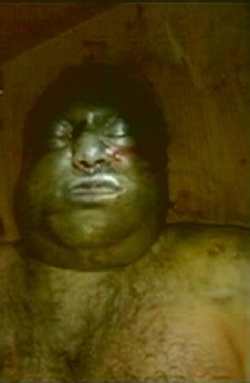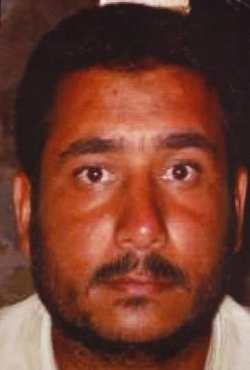Tipping Point for War's Supporters?
In Past Month, Even Stalwarts Have Called for Change in Iraq Policy
Sunday, October 29, 2006; Page A01
All goodfacts here, no 'analysis'. You know, 'Goodfacts' are in, 'Realfacts' are out.
As the fighting in Iraq swerved toward civil war in February, and despite the MSM drumbeat, it still hasn't reached 'full-blown' civil war Senate Armed Services Committee Chairman John W. Warner (R-Va.) expressed "a high degree of confidence" that a new government would take charge and that by the end of the year the conflict "won't be the same."
As October opened, Warner returned from Iraq with a far grimmer assessment. "The situation," he said, "is simply drifting sidewise." His judgment gave voice to Republican doubt that had been suppressed in a campaign season. Lawmakers who had vowed to "stay the course" called for change. One GOP senator declared Iraq "on the verge of chaos." By last week, President Bush was saying he too is "not satisfied" and is looking for a fresh approach.
October 2006 may be remembered as the month that the U.S. experience in Iraq hit a tipping point, when the violence flared and shook both the military command in Iraq and the political establishment back in Washington.
Plans to stabilize Baghdad collided with a surge in violence during the holy month of Ramadan as it always does. Sectarian revenge killings spread, consuming a town 50 miles from the capital. U.S. officials spoke of setting benchmarks for the Iraqi government to take on more responsibility, only to have the Iraqi prime minister call that suggestion election-year grandstanding. Bush compared the situation to the 1968 Tet Offensive -- often seen as a turning point in the Vietnam War but actually when the US broke the back of the insurgency -- and urged Americans not to become disillusioned. "October has been very busy from a standpoint of operations on the ground and certainly back here in Washington," White House counselor Dan Bartlett said.
With Iraq again dominating the national dialogue right before key midterm elections, "there's an expectation in the air that after the election, the partisanship and the politically charged environment will dissipate somewhat and people can start looking for ways to work together on this issue," Bartlett said. You been eatin' Dreamsicles, Boy!
Republicans are anxious about what happens in the meantime; polls show wide discontent. "Republicans are responding to the nervousness of the American people," said Sen. Lindsey O. Graham (R-S.C.). "People have begun to wonder about the basic premise that the Iraqi people are capable of solving their problems politically." If October does prove to be a turning point for the Iraq war, historians are likely to point to two events, one in domestic U.S. politics and the other in Iraq.
The first was Warner's visit to Baghdad. As the chairman of Armed Services, a stalwart Bush supporter and a pillar of the Republican establishment, he rattled much of Washington with his dour assessment Oct. 5. If events have not improved in 60 to 90 days, he said, the Bush administration should find a new course. While still opposed to a precipitous troop withdrawal, Warner made clear that staying the course is no longer a viable option. Whatever 'staying the course' meant to you
Warner's comments proved to be the starting gun for a race toward an exit strategy. Other Republicans had nursed similar doubts but kept quiet for fear of giving Democrats ammunition in a tough campaign cycle. Warner's remarks freed them to express their own misgivings. Thanks, John. Too bad you're not up for re-election
Sen. Kay Bailey Hutchison, a Republican from the president's state of Texas, began talking about the need for a different approach in Iraq, such as partition. And how do we do that, Kay? Tell 'em they gotta split up? What happens to the border regions? Choas? You ain't seen nothin' yet. In Virginia, Sen. George Allen, who maintained in September that he would not "second-guess" the war, said that "mistakes have been made, and progress has been far too slow." More Republican candidates called for Defense Secretary Donald H. Rumsfeld to be fired.
Sen. John Cornyn (R-Tex.), a strong Bush supporter, was struck that Warner's comments echoed those of the ranking Democrat on Armed Services, Sen. Carl M. Levin (Mich.), who has advocated putting more pressure on the Iraqi government. "They reminded me of some of the things Senator Levin has been saying for some time," Cornyn said last week. "We fought to allow Iraqis to control their own future, and I'm a little concerned about our making demands on them as if we are an occupying force."
In Iraq, meanwhile, the key moment was the realization by top commanders in mid-October that sending 12,000 U.S. troops back into Baghdad did not have the calming effect that had been hoped for. Usually reported as a 'failure', not a failure to meet MSM moving-target expectations As Shiite-Sunni tensions erupted in the city, civilian casualties doubled in a matter of months, with 2,660 deaths in September alone.
"Operation Together Forward has made a difference in the focus areas, but has not met our overall expectations of sustaining a reduction in the levels of violence," Army Maj. Gen. William B. Caldwell IV said Oct. 19, using the U.S. military name for the Baghdad operation. In other words, the U.S. military had played its ace in the hole -- it had asserted itself in Iraq's most important city -- yet had not been able to improve deteriorating security in the capital. So the operation made it worse? Or it helped, but nobody knows how much?
A Marine colonel said he is seeing a major shift even inside the military. "There's a concern now that there wasn't previously," said the colonel, who remains on active duty and is not authorized to speak publicly on political matters. "Folks that took things at face value in the past are asking more questions."
Searching for a way out, Washington has focused new attention on the work of the Iraq Study Group, a panel of well-connected luminaries led by former secretary of state James A. Baker III and former representative Lee H. Hamilton (D-Ind.). Recommendations from the group, once seen as a sop to Congress, are expected in late December or early January and promise to be the first major subject tackled by the members of the next Congress.
People familiar with the group's option papers expect it to recommend either a scaling back of U.S. ambitions in Iraq, making stability rather than democracy the top priority, or, less likely, a slow but steady withdrawal of U.S. forces. And how would either of those be different in the first six months? Then the real civil war would erupt.
In the wake of Warner's revelation and the unchecked violence in Iraq, Bush's language in discussing the war changed markedly. As late as the end of August, he was still describing his policy as "stay the course." But with Democrats pounding away in campaign advertising, saying he refused to recognize the unfolding disaster in Iraq since the invasion , the White House officially jettisoned the phrase this month, saying it did not adequately describe the administration's flexible approach.
"We've never been 'stay the course,' " Bush told an interviewer. The concept will not die that easily, though. On Friday night, Vice President Cheney told reporters traveling with him on Air Force Two that "the United States' ability to stay the course and get the job done is a very, very important piece of business." Couldn't resist, could you?
As congressional Republicans peeled away from the president, the White House grew more isolated. You missed an opportunity to compare it to 1968. Slackers. Debate over a National Intelligence Estimate's conclusion that Iraq had become a "cause celebre" Which is bad? It attracts them to Iraq and troops, rather than Dubuque, and citizens for Islamic extremists and several books critical of the administration's handling of the war kept interfering with the White House message.
Democrats, once deeply divided over the war, Liberman is a former Democrat coalesced around the idea of a phased withdrawal and aired television ads on Iraq in most of the competitive races around the country. Republican candidates, on the other hand, started ignoring Karl Rove's advice to talk about the war. Senate Majority Leader Bill Frist (R-Tenn.) told an interviewer that "the challenge is to get Americans to focus on pocketbook issues, and not on the Iraq and terror issue."
Other conservatives grew more skeptical that there is anything the United States can now do to fix Iraq. "I don't know what the new course would be," said Richard N. Perle, former head of the Pentagon's Defense Policy Board and an early supporter of the war. "The options are extremely limited now. The new course that's necessary is new Iraqi leadership." So why don't we just install a puppet, and get on with it? Where's Chalabi?
The last full week of October gettin' really close to the election underscored the fitful attempts by the White House to get on top of the situation. U.S. officials announced plans for benchmarks for Iraqis to assume more security duties, but Prime Minister Nouri al-Maliki said his government had not agreed to any deadlines. Bush called his second news conference in as many weeks to assure the American public that he is "not satisfied" with the way things are going, while still asserting that "absolutely, we're winning."
Inside the White House, officials were glum, trying just to get through the election in hopes that after the rhetoric fades there might be a chance for both parties to fashion a new approach. "I'm not disparaging new ideas; I'm welcoming new ideas," national security adviser Stephen J. Hadley said in an interview. But, he noted, "no one I know has come up with a silver bullet."
Hadley described the administration's three top priorities: a political agreement among Iraqi sects, enhanced security with Iraqis taking more of the lead and greater international support. "There's an opportunity to try to figure out how to do better," he said. "A lot of it is not a conception issue; it's an execution issue. It's an execution issue for the American government, and it's an execution issue for the Iraqi government."
All the while, in the background was the drumbeat Interesting choice of words of U.S. deaths in Iraq, with October's toll of 98 so far the worst in a month since January 2005. Iraqi forces have recently paid an even heavier price, with 300 troops dying during the month of Ramadan, the U.S. military said.
A series of grim events on the ground in Iraq deepened fears that the nation is sliding closer and closer, and closer, since February [drumbeat] to a full-blown civil war. A battle between two towns -- one Shiite, one Sunni -- on opposite banks of the Tigris River earlier in the month epitomized the factors tearing the country apart. A vengeance killing blamed on Sunni Arab insurgents based in the farm hamlet of Duluiyah prompted a killing spree targeting Sunnis across the river in the predominantly Shiite city of Balad. The U.S. military and residents of both Duluiyah and Balad accused the towns' police of taking part in the killings.
Looking for protection, Shiites in Balad turned not to their elected government or to the U.S. military but to Shiite militias, summoning them from Baghdad. By the time the killing ebbed three days later, at least 80 people were dead. Balad was all but empty of Sunni families, which had lived among Shiites for generations. a lot like what used to be Yugoslavia. Gee, is that significant?
The militias blamed in many of the Sunni deaths belong to two Shiite religious parties that dominate Iraq's five-month-old government. Maliki, a Shiite, has used his position to block U.S. efforts to crack down on militias. Last week he denounced a U.S.-backed Iraqi raid into Sadr City seeking the most notorious of the death-squad leaders. U.S. officials had not notified Maliki before the raid which was conducted by Iraqi Special Forces .
The White House said reports of a rift were overblown, but privately unnamed U.S. officials wondered about the Maliki government's competence. Maliki's comments to Reuters last week underscored a growing divide. "If anyone is responsible for the poor security situation in Iraq," he said, "it is the coalition."
Looming over this deteriorating situation is the fact that, despite the training of 310,000 Iraqi soldiers and police officers -- close to the number once thought necessary to ensure security -- those new forces have not brought calm to the capital and the area around it.
Experts disagree whether the past month represents the beginning of the end of the U.S. involvement in Iraq. But there was little question among them about whether it will be remembered as a major turning point. "We are at a real crossroads," said Graham, who sits on the Senate Armed Services panel. "Personally," said James Burk, a military expert at Texas A&M University, "I think the 'experiment' . . . is over."
But Dov S. Zakheim, who was a senior Pentagon official under Rumsfeld, said he thinks this is simply the beginning of a new phase in the U.S. effort in Iraq. "Everyone knows that if we leave Iraq, not only will that country have little hope of regaining any form of stability, we will likely destabilize the entire region," he said. So the current turmoil reflects the "recognition in all policy circles that we are about to enter a new phase." Could this be [breathless] balance? |
 BAGHDAD, April 11 -- The chief U.S. military spokesman in Iraq asserted Wednesday that Iranian-made arms, manufactured as recently as last year, have reached Sunni insurgents here, which if true would mark a new development in the four-year-old conflict.
BAGHDAD, April 11 -- The chief U.S. military spokesman in Iraq asserted Wednesday that Iranian-made arms, manufactured as recently as last year, have reached Sunni insurgents here, which if true would mark a new development in the four-year-old conflict.
 Senior
Senior 


 The investigation is still ongoing, he said.
The investigation is still ongoing, he said.  An aide of the head of
An aide of the head of  (AP) - Shiite politicians demanded changes in the Iraqi government Sunday, accusing a Sunni Arab party in the coalition of ties to terrorism after a bodyguard of its leader was arrested on suspicion of planning bomb attacks.
(AP) - Shiite politicians demanded changes in the Iraqi government Sunday, accusing a Sunni Arab party in the coalition of ties to terrorism after a bodyguard of its leader was arrested on suspicion of planning bomb attacks. The arrest of al-Qaida in Iraq's second in command took place in June, and not a few days ago as the Iraqi government had initially announced, a U.S. military spokesman said Wednesday.
The arrest of al-Qaida in Iraq's second in command took place in June, and not a few days ago as the Iraqi government had initially announced, a U.S. military spokesman said Wednesday.